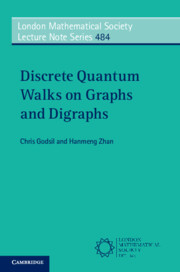
-
Select format
-
- Publisher:
- Cambridge University Press
- Publication date:
- December 2022
- January 2023
- ISBN:
- 9781009261692
- 9781009261685
- Dimensions:
- Weight & Pages:
- Dimensions:
- (229 x 152 mm)
- Weight & Pages:
- 0.23kg, 300 Pages
You may already have access via personal or institutional login
Book description
Discrete quantum walks are quantum analogues of classical random walks. They are an important tool in quantum computing and a number of algorithms can be viewed as discrete quantum walks, in particular Grover's search algorithm. These walks are constructed on an underlying graph, and so there is a relation between properties of walks and properties of the graph. This book studies the mathematical problems that arise from this connection, and the different classes of walks that arise. Written at a level suitable for graduate students in mathematics, the only prerequisites are linear algebra and basic graph theory; no prior knowledge of physics is required. The text serves as an introduction to this important and rapidly developing area for mathematicians and as a detailed reference for computer scientists and physicists working on quantum information theory.
Contents
-
1 - Grover Search
pp 1-10 -
-
- You have access
- Export citation
-
Metrics
Full text views
Full text views help Loading metrics...
Loading metrics...
* Views captured on Cambridge Core between #date#. This data will be updated every 24 hours.
Usage data cannot currently be displayed.
Accessibility standard: Unknown
Why this information is here
This section outlines the accessibility features of this content - including support for screen readers, full keyboard navigation and high-contrast display options. This may not be relevant for you.
Accessibility Information
Accessibility compliance for the PDF of this book is currently unknown and may be updated in the future.


